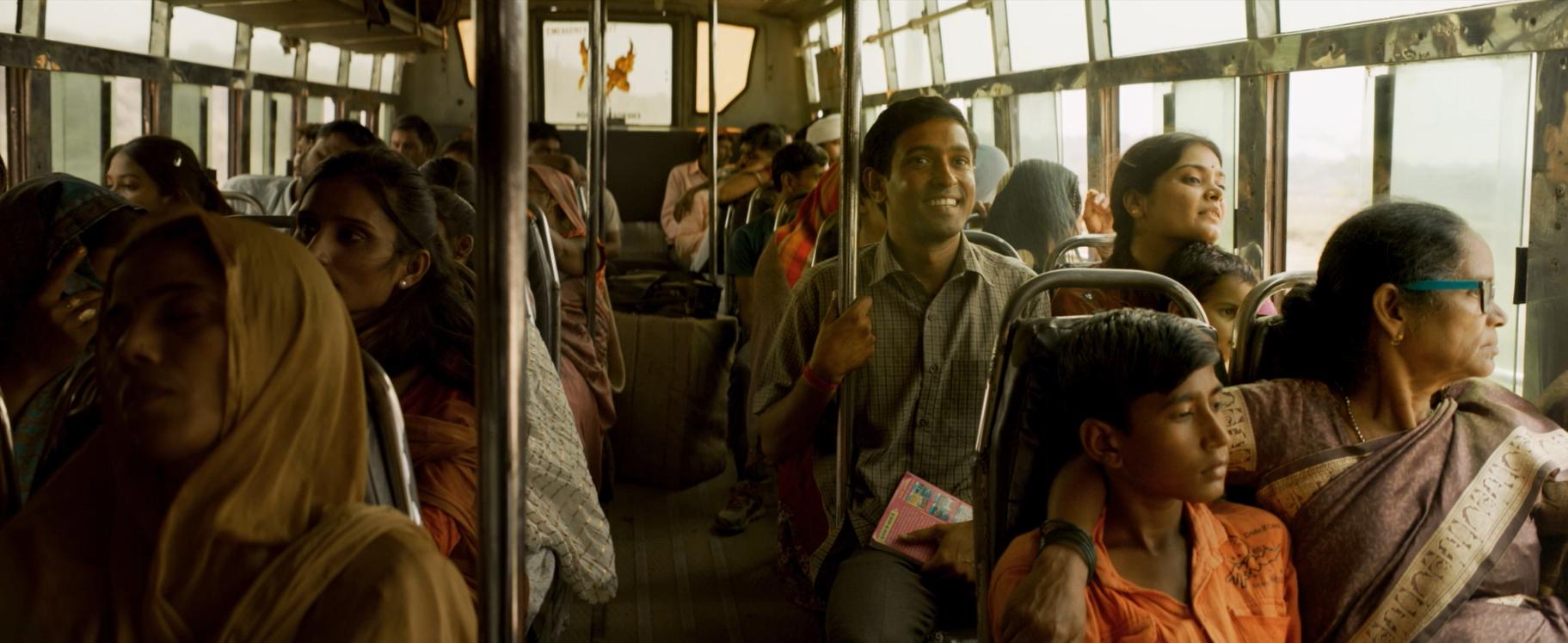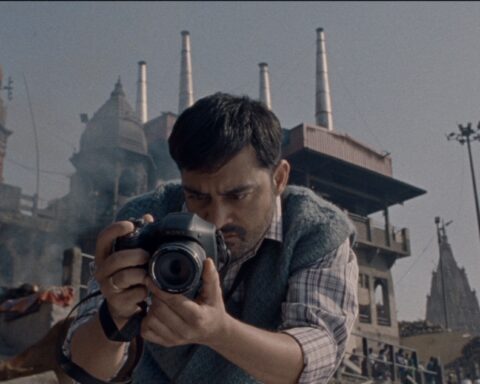Embarking on the arduous journey of preparing for the UPSC, one of India’s most formidable competitive exams, has evolved from an enigma to a well-explored odyssey for young students. Sincere web series like TVF Aspirants and Sandeep Bhaiya have acted as our guides, offering glimpses into the fiercely competitive world thriving in the heart of Rajinder Nagar, painting a vivid picture of the sacrifices, yearning, and challenges that define the journey. Yet, amid this familiar backdrop, Vidhu Vinod Chopra‘s latest outing, 12th Fail emerges as a breath of fresh air cutting across the clichés associated with the genre of the undying spirit of an underdog story. Adapted from Anurag Pathak’s eponymous novel and inspired by the real-life saga of IPS Officer Manoj Kumar Sharma, the film unveils a finely nuanced tale unraveling the indomitable spirit of a young student. What sets it apart is the ability to not merely retell the story of struggle and triumph but also weave a rich collage of emotional canvas on which budding aspirants are painted with intricate strokes of authenticity and depth.
Set in India’s infamous Chambal region, Manoj Kumar Sharma (Vikrant Massey) is the son of an honest clerk Ramveer (Harish Khanna). Having confronted the corrupt MLA’s dishonest practices, Ramveer pays the price by being suspended from his job. Manoj’s academic journey takes a hit when a newly appointed DSP, Dushyant Singh (Priyanshu Chatterjee), disallows cheating during his 12th exam. Fueled by the ambition to challenge his suspension orders, Ramveer takes the matter to the high court and leaves the village. To sustain the family, Manoj and his brother resort to starting a makeshift rickshaw service. Unfortunately, circumstances take a turn for the worse, leading both brothers to end up in police custody. Manoj turns to Dushyant for help, finding inspiration in the DSP’s strength and integrity. This experience propels Manoj’s aspiration to become a police officer. Manoj managed to complete his graduation in History and Hindi. With financial support from his grandmother (Sarita Joshi), he sets off for Gwalior to enroll in the government PSC coaching centre. However, an unexpected encounter with fellow aspirant Pritam Pandey (Anant V Joshi) alters his plans, redirecting him to Delhi for UPSC preparation. In the chaotic whirl of the capital’s Mukherjee Nagar, Manoj meets Gauri Bhaiya (Anshumaan Pushkar), a mentor who imparts the essential knowledge and skills needed to navigate the challenging UPSC landscape. Amid the rigorous preparation, a delightful surprise comes in the form of Shraddha Joshi (Medha Shankar), an aspirant aiming for the PCS. 12th Fail takes a romantic turn as Manoj and Shraddha fall in love. How Manoj and Shraddha steer in their professional and personal lives forms the core of the film.

Manoj juggles a grueling fifteen-hour shift within the confined space of the flour mill which is anything but a suitable abode. It symbolizes a societal structure that confines individuals like him from the lower rungs, squeezing them into corners of opportunity. Yet, within this cramped space, Manoj refuses to be diminished. Instead, he elevates it into a haven of ambition, where the grinding wheels echo the determination within his spirit. The mill also serves as a rendezvous point for the most significant characters in his life. Ramveer, the pillar of honesty, Shraddha, the unexpected beacon of love, and Pritam, the companion in this tumultuous journey, also find their way into this unassuming space, forming a mosaic of relationships against the backdrop of the mechanical noise. Moreover, those witnessing Manoj’s odyssey from close quarters are individuals marked by societal labels of ‘failure’ with the exception of Shraddha. Yet, within the realm of their perceived shortcomings, they become pillars of unwavering moral support for him. The resonating verses of the poem Haar Nahin Manoonga (Won’t Give Up) by the former Indian Prime Minister, Atal Bihari Vajpayee, weave seamlessly into the fabric of the narrative. The defiant declaration echoes through the corridors of the story, and it is Manoj who becomes the living embodiment of these powerful stanzas.
The narrative unveils a restrained approach, a cinematic elegance that allows the dramatic moments to unfold with deliberate leisure. At the beginning of the film, Dushyant’s unyielding stance against bribery from the principal of the school is captured in a lingering long take allowing the tension to build organically. Manoj undertakes the arduous ascent of fifty hilly steps to Shraddha’s house in Mussoorie, only to be met with rejection. The finesse in the scene is evident as the camera remains focused on Manoj’s face during the phone conversation. This choice immerses the audience in the depth of his emotions, capturing every nuance of his reaction. The interview scene, a crucial juncture in Manoj’s journey, is handled with exquisite overtone. Chopra steers clear of the melodramatic pitfalls, instead, infusing the interaction with a sheen of authenticity and liveliness. His directorial restraint becomes a brushstroke, painting the film with a sophistication that elevates it beyond the ordinary. The final moments of 12th Fail, deftly navigates the delicate balance of uncertainty, leaving the audience perched on the edge of anticipation. While the outcome of Manoj Kumar Sharma’s journey may be foreseeable, the execution of the concluding moments evokes an exhilarating sense of relief that is both cathartic and deeply satisfying. However, the sudden appearance of Gauri Bhaiya with the uniform and Zia Arora may feel like a contrived convenience. But might be considered a small blemish rather than a significant flaw.

Rangarajan Ramabadran‘s cinematography employs earthy tones in capturing the village in the Chambal region. When transitioning to the hustle and bustle of Mukherjee Nagar, Ramabadran’s lens transforms the screen with a vibrant palette that mirrors the energetic and dynamic nature of the urban setting. The camera becomes a silent observer, capturing the subtleties of expression, the interplay of emotions, and the unspoken dynamics that define the pivotal moment. With the collaborative efforts of Chopra and Jaskunwar Kohli as writers and editors, a prudent approach allows the narrative to breathe, granting the emotions ample time to seep in and manifest in a rhythm that feels purposefully measured. This deliberate approach transforms 12th Fail into a visceral experience that lingers long after the credits roll. The sound design by Manav Shrotriya adeptly captures moments of chaos, nuances, and silences with alacrity, transporting us seamlessly into the universe of the film and heightening our engagement with the characters. Shantanu Moitra‘s background score works in tandem to create an auditory symphony that not only captures the essence of each moment but also elevates the emotional resonance. The production and costume design, helmed by Prashant Bidkar and Malvika Bajaj respectively, work in tandem and seamlessly blend aesthetics and harmony with the film’s milieu.
Vikrant Massey, in his role as Manoj, skillfully brings forth a myriad of shades to his character. His nuanced performance allows us to empathize with the character’s journey, laying the foundation for the transformation from an ignorant teenager to the unwavering determination of a struggling young competitor. His performance goes beyond mere dialogue delivery and cements his status as a standout talent. Medha Shankar, as Shraddha, brings an innocent charm and agility to her character, standing on par with her co-actor as a couple. In his supporting role, Anant V Joshi as Pritam Pandey delivers a nuanced portrayal that captures the dual intention of support and jealousy with finesse. Anshumaan Pushkar, as the mentor of Gauri Bhaiya, brings an uplifting presence to 12th Fail. However, the character seems to be a variation of the ‘Sandeep Bhaiya’ trope, albeit with a slightly weaker impact. Priyanshu Chatterjee, in the role of Dushyant, plays a small yet effective part as an upright law enforcement officer.
12th Fail serves as a stern commentary on the societal dynamics where education becomes a vital tool for individuals from less privileged backgrounds to claim their deserved rights and respect under the sun. It also takes a critical stance on the dubious nature of some coaching institutes in the country. However, its most noteworthy aspect lies in its refusal to idolize real-life characters, avoiding the trap of making them larger than life. Instead, every character is presented as distinctly human, fostering relatability. Such attributes hold significant lessons for budding filmmakers in the Hindi film industry to rejuvenate their filmmaking practices with the mantra of ‘restart.’
12th Fail is currently streaming on Disney+ Hotstar.




